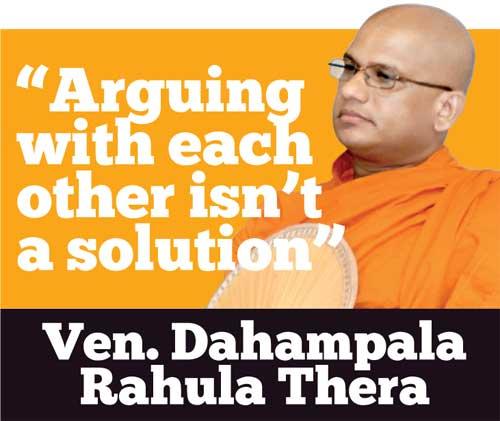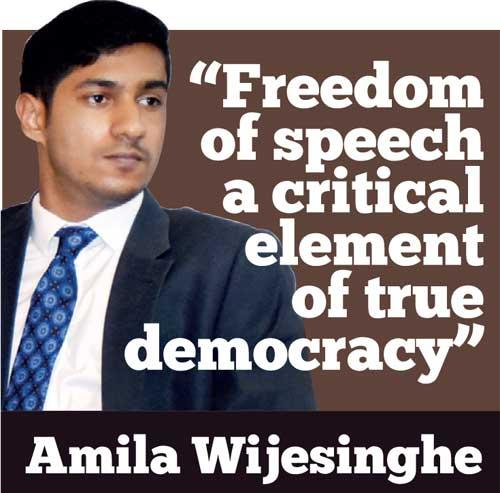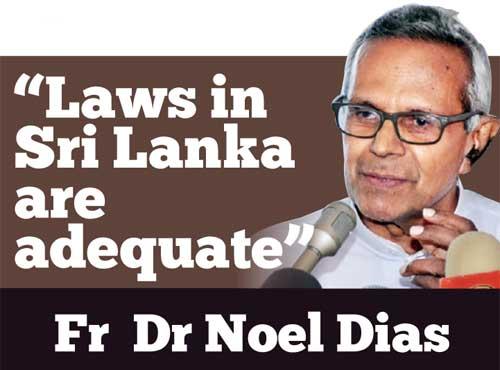Reply To:
Name - Reply Comment
Last Updated : 2024-04-19 09:27:00

- In 1981 the Jaffna Library was burnt and in 1983 we witnessed bloody ethnic riots again between these two groups, that claimed the lives of many
- Although hate speech laws are intended to protect minorities, the social norms they are based on, are determined by the majority
- Certain media personnel were guilty of their broadcasts. They were considered similar to those committed heinous crimes
Much has been spoken about hate speech and several interpretations of the International Covenant on Civil and Political Rights (ICCPR) Act have also been made. In the aftermath of the Easter Sunday attacks, the state decided to ban social media on several occasions, as means of cutting down the impact of hate speech. The ICCPR Act states that no person shall  propagate war or advocate racial or religious hatred that constitutes an incitement to discrimination, hostility and violence. Laws with broader definitions are already in place but when and on whom they are being implemented have always been reasonable doubts.
propagate war or advocate racial or religious hatred that constitutes an incitement to discrimination, hostility and violence. Laws with broader definitions are already in place but when and on whom they are being implemented have always been reasonable doubts.
In this backdrop, a panel discussion was organized to understand what it is all about and what needs to be done in terms of countering hate speech. The eminent panel of speakers included members of the clergy as well as members of the legal fraternity.
"Those who don’t understand this art spreads hate. People arguing with each other is a daily occurrence but this isn’t a solution. So we need to opt for an alternative"
 In his opening remarks, Ven. Dahampala Rahula Thera, a lecturer at the Buddhist and Pali Studies University said that there are two approaches to hate speech; verbal and written and they arise when one doesn’t understand the art of living. “Those who don’t understand this art spread hate. People arguing with each other is a daily occurrence but this isn’t a solution. So we need to opt for an alternative.
In his opening remarks, Ven. Dahampala Rahula Thera, a lecturer at the Buddhist and Pali Studies University said that there are two approaches to hate speech; verbal and written and they arise when one doesn’t understand the art of living. “Those who don’t understand this art spread hate. People arguing with each other is a daily occurrence but this isn’t a solution. So we need to opt for an alternative.
In countries like Japan, it’s nice to see people respecting each other. It comes with the education system, but the local system doesn’t teach people this art of living. If we get angry with another person’s remarks, we tend to aggravate the situation. This is the same in writing as well. There have been indications of hate speech in ancient scripts as well. They go to the extent of proposing to slit throats and cut people’s tongues away. In India, the Dalits were treated this way. This is why the Buddha emerged, in order to spread peace and love among all human beings. As he preached the concept of ‘maithri’ he became a friend among people of all communities. Words have a way of setting off chemical reactions within our body. Hate speech, especially in writing has been the source of inspiration for terrorist bodies such as Al-Qaeda and Boko Haram. We don’t need war, we need to live like one big family. When the Easter Sunday attacks happened, we didn’t go to take revenge from people and that’s a good start in this recovery process.”
“The recent events have got renewed public interest in terms of speech regulation,” said Amila Wijesinghe, Partner at West End Law Centre and international law researcher. “Sri Lanka already has certain forms of speech regulation in the Penal Code and the ICCPR Act. Yet, much of the discussion has been centred on the greater utilization of these laws or bringing in new hate speech laws. Freedom of speech is something often taken for granted because there’s a lack of understanding as to why it is such a fragile yet a vital principle. Hate speech is rather an elusive concept and there’s no universally accepted legal definition. This reflects the inherent subjectivity of the concept. In fact, it’s a term that could be applied to a number of things by different people and at different times. What was hate a few decades ago maybe the opposite today. The ICCPR Act prohibits any adversity in terms of race or religion that constitutes an incitement to discrimination or violence. This is being incorporated into the Sri Lankan law through the ICCPR Act. The problem with broad definitions like these is that it leaves room for much interpretation. What are hatred and hostility? The state or courts will be the ones who decide on public morality and societal norms which are the lenses through which these terms are interpreted. Social norms change, depending on the time and place we happen to be. What was hatred yesterday, may not be so tomorrow. Although hate speech laws are intended to protect minorities, the social norms they are based on, are determined by the majority. It’s important for people to know what  speech is prohibited. If the academics aren’t sure of what hate speech means and we legislate against uncertain, abstract concepts, then how can we expect a layperson to know what he can and cannot say. Hence, the ambiguity surrounding this would lead to self-censorship and a chilling effect on speech.”
speech is prohibited. If the academics aren’t sure of what hate speech means and we legislate against uncertain, abstract concepts, then how can we expect a layperson to know what he can and cannot say. Hence, the ambiguity surrounding this would lead to self-censorship and a chilling effect on speech.”
"It’s a critical element of true democracy. Political speech is important but it would be dangerous to allow the state to decide what constitutes political speech. The most important issues also tend to be the most controversial"
He further said that freedom of speech is one of the most important rights, without which the right to vote, freedom of association, freedom of religion and freedom to manifest one’s religion makes little sense. “It’s a critical element of true democracy. Political speech is important but it would be dangerous to allow the state to decide what constitutes political speech. The most important issues also tend to be the most controversial. We all seem to love free speech but it’s the speech of others that we are concerned about. It’s through a coalition of contrasting ideas that we could broaden our perspectives. The spread of extremist ideological material has become a widespread threat. Terrorists utilize the Internet and other resources to promote their ideologies. Extremists target the weak in society and it’s important to be vigilant. It’s not clear whether hate speech is causal or symptomatic of underlying issues. The best way to combat bad ideas is through better ideas.”
In his comments, Fr (Dr) Noel Dias, Lecturer at Sri Lanka Law College and the University of Colombo said that Christianity says that people should love one another and at the same time they should also love God. “The remedy for hate speech is nothing but to love. All religions come to that common point but Christianity also speaks about forgiveness. This is where the story of salvation begins. Therefore, forgiveness is the answer to hate speech. In terms of the law, we need to find out in which way people are engaged in hate speech.”
 Drawing an example from the days of the Rwandan genocide, Fr. Dias spoke about how hate speech was defined during this incident. “Certain media personnel were guilty of their broadcasts. They were considered similar to those committed heinous crimes. The publications, broadcasts and pictures produced and promoted ethnic atrocities, incitement to genocide and crimes against humanity. The Hutu media criticized the Tutsi people as hypocrites. Media accused the Tutsi women of intentionally using their sexuality to lure Hutu men. I think the laws in Sri Lanka are adequate but we need to discuss on the punishments. But apart from the law, we need to abide by humanity.”
Drawing an example from the days of the Rwandan genocide, Fr. Dias spoke about how hate speech was defined during this incident. “Certain media personnel were guilty of their broadcasts. They were considered similar to those committed heinous crimes. The publications, broadcasts and pictures produced and promoted ethnic atrocities, incitement to genocide and crimes against humanity. The Hutu media criticized the Tutsi people as hypocrites. Media accused the Tutsi women of intentionally using their sexuality to lure Hutu men. I think the laws in Sri Lanka are adequate but we need to discuss on the punishments. But apart from the law, we need to abide by humanity.”
"The local system doesn’t teach people this art of living. If we get angry with another person’s remarks, we tend to intensify the situation"
“When we look at hate speech, we can’t look at regulations implemented in other countries and find an effective solution,” opined President’s Counsel Ali Sabry. “But we could certainly draw inspiration from them. 72 years after independence, do we have space to stand up on our own feet? If we look back, we need to accept the fact that we have failed to stand up as a nation. We couldn’t develop the Sri Lankan identity. We had issues even before the Easter attacks happened and therefore we need to look at this issue with an open mind. Firstly, we are humans and we need to respect humanity. Then comes religion. The Quran has become a greatly misinterpreted religious text. Prophet Mohamed states that to have peace with your neighbour is far better than charity, prayer and fasting. Because if you don’t have peace, it will lead to chaos. He states not to harass women and children during the war. If we think about inequalities, we will never find peace. Today there are 1.2 million Sri Lankans living in the Middle East. Media is sparking a division among people. In 1956, we witnessed ethnic unrest between majority Sinhalese and minority Tamil groups, in 1981 the Jaffna Library was burnt and in 1983 we witnessed bloody ethnic riots again between these two groups, that claimed the lives of many.”
"When the Berlin Wall was erected, those in East Germany threw dirt to those in West Germany. But in return, the people in West Germany
sent them fruits and said ‘everyone gives what they have..."
“So the time has come for us to have a paradigm shift in the way we think,” he added. “Lee Kwan Yu said that a country cannot develop if there are ethnic tensions. He didn’t allow hate speech and implemented the law as and when required. The Penal Code and the ICCPR Act mentions the law but whether it is being implemented is the question. We also have a Prevention of Terrorism Act which states that any person who by words either spoken or intended to be read or by signs or by visible representation or otherwise causes or intends to cause acts of violence of religious, racial or communal disharmony or feeling of ill-will or hostility between the different communities or religious groups can be charged for 20 years. We need a cybersecurity law and monitoring of social media. Irrespective of when and where we find extremists, we need to get together as one Sri Lankan family. This could be done by showing love and by bridging gaps between one another. When the Berlin Wall was erected, those in East Germany threw dirt to those in West Germany. But in return, the people in West Germany sent them fruits and said ‘everyone gives what they have.’ This is how we should solve this problem. So we need to implement the law and legislate against those who spread hatred. You can either live as Muslims in Sri Lanka or Muslims of Sri Lanka. You need to adapt to the Sri Lankan culture. We have shared the culture for years and this needs to continue. The media has a bigger role to play in dousing flames of hatred, but right now media is like a Dracula, going in search of blood to report on bloody acts of violence and get their ratings.”
Pix by Kushan pathiraja

Add comment
Comments will be edited (grammar, spelling and slang) and authorized at the discretion of Daily Mirror online. The website also has the right not to publish selected comments.
Reply To:
Name - Reply Comment
On March 26, a couple arriving from Thailand was arrested with 88 live animal
According to villagers from Naula-Moragolla out of 105 families 80 can afford
Is the situation in Sri Lanka so grim that locals harbour hope that they coul
A recent post on social media revealed that three purple-faced langurs near t

10 Apr 2024
09 Apr 2024